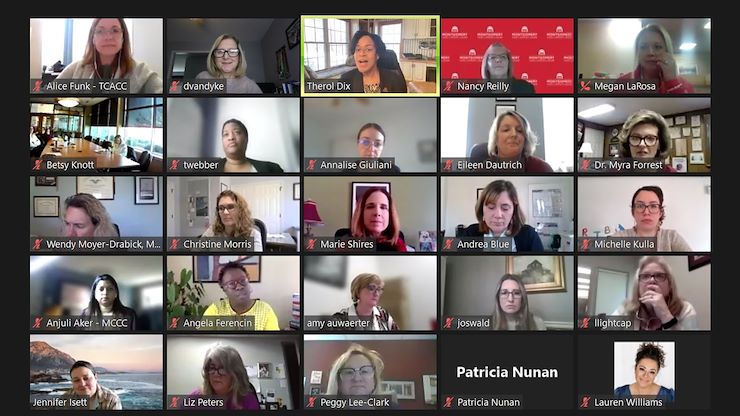
MCCC Vice President of the Pottstown Campus & Educational Partnerships Therol Dix discusses the value of mentorship at a recent TriCounty Area Chamber of Commerce REACH program. Screenshot by Diane VanDyke
Mentorship is an impactful gift we can both give and receive throughout our lives. During the TriCounty Area Chamber of Commerce’s recent online REACH Program, Montgomery County Community College’s Vice President of the Pottstown Campus and Educational Partnerships, Therol Dix, J.D., spoke about this valuable gift, its many benefits and how it transformed her life.
“My experiences with mentorship I believe brought me to where I am today and have informed all of my career choices,” said Dix, as she started her presentation with more than 35 attendees on Zoom.
Dix holds a bachelor’s degree in communications studies from the University of California, Los Angeles; a master’s degree in communication from the Annenberg School for Communication at the University of Pennsylvania; and a Juris Doctor degree from Georgetown University Law Center.
Following law school, Dix was an Assistant District Attorney for Montgomery County and was an associate attorney at Ballard, Spahr, Andrews & Ingersoll, LLP. She decided to leave the legal world to pursue a career in higher education. She started her tenure at MCCC as a full-time instructor and co-coordinator in the Mass Media Studies and Production Department. She then was appointed to serve as Dean of Arts and Humanities and then as vice president.
Humble Beginnings
Dix’s journey began in Camden, New Jersey, where she was born and raised.
“My family was very poor, and we were often without food, electricity and hot water, and sometimes we were homeless,” she said about her childhood.
Despite her circumstances, she said, her parents loved her very much and were her “biggest cheerleaders.” While her parents provided unlimited support, they were not her mentors because of their limited life experiences and education.
“It was my teachers who filled in the gaps for me as early mentors and provided that practical guidance needed to assist me in achieving my goals,” she said.
When Dix graduated from high school, she was determined to move far, far away from her impoverished neighborhood. In fact, she moved across the country to attend UCLA on a dance scholarship.
However, upon her arrival, Dix realized that she and her family had not applied for housing, which they did not know was separate from tuition. This unexpected challenge and the myriad other challenges she encountered throughout her life made her realize the importance of reaching out for help and seeking the gift of mentorship.
At this point in the program, Dix asked the participants to go into break-out rooms in small groups to discuss mentorship and their experiences as both mentors and mentees.
 After the break-out session, the groups shared their feedback. Their comments included
how many people benefitted not only from being mentored but also from mentoring others.
Some said that mentorship was not always intentional or could even be described as
“accidental.”
After the break-out session, the groups shared their feedback. Their comments included
how many people benefitted not only from being mentored but also from mentoring others.
Some said that mentorship was not always intentional or could even be described as
“accidental.”
Returning to her presentation, Dix said that she had mentorships in every sphere of her life, both professionally and personally. When she went to college, she had dreams of becoming a dancer, but her straightforward path to stardom turned out to be a winding journey instead.
Her plans were challenged when she had her first major dance audition. Her expectations of being selected for the role were squashed when she saw the hundreds of other applicants who also were well-qualified.
“The pain of the rejection I experienced and the realization of the very low probability that I would be successful in that field hit hard and early,” she said. “It was a very brave and courageous mentor who told me this and helped me change my major to communication, which she thought I was better suited for.”
“I then went on to earn my master’s and then a law degree and work in the district attorney’s office as you previously heard. My resume is a patchwork quilt for sure. But a mentor traveled with me during each hairpin turn and each steep ascent and descent, and there were many, many descents, and that mentor helped to shape me into the person I am today,” she said.
Six Gifts of Mentorship
Dix shared six valuable gifts that her mentors taught her.
- Get on the bike. “It is important to take action,” she said. “Starting is often the hardest part–procrastination, fear and self-doubt will prevent you from starting the journey.” When she was contemplating leaving the legal field to teach, for example, her mentor told her to stop complaining and finding excuses and to “get on the bike.”
- Balance the bike. Mentors taught Dix the importance of setting boundaries. “It is really easy to take on too much and neglect the necessary self-care you need to be successful yourself,” she said.
- Bike in tandem. Mentors taught Dix the importance of reaching out for help from others. Each recalibration in her career journey brought a huge learning curve and mentors cautioned her to be proactive by reaching out for help.
- Don’t focus on the other bikes. “It is ok to glance at others and their progress but don’t become laser-focused on the bikes ahead of you. When you focus on others, you run the risk of losing sight of who you are and your unique value,” she said.
- Get back on the bike. “Sometimes you will fall, and sometimes falls are good because they can help us to reset and adjust,” she said. Just before Dix’s junior year in college, her mother died suddenly, and it was devastating. Her mentor, however, told her to get back on the bike.
- Get off the bike. “Why? Maybe you are at the end of a journey or maybe you are on the wrong journey. Take a time out,” she said. There were times Dix was on the wrong journey, and change is permissible and sometimes necessary.
“Change brought me to higher ed, where again, mentors have invested in my success,” she said. “Even at this point in my career, I’m still being mentored. I believe it is a never-ending process.”
The Reach
During her journey, Dix realized there were people she could mentor as well.
“No matter if I’m an advanced, intermediary or beginner rider on the path, there’s always someone behind me who can learn from me,” she said. “I have a profound awareness and appreciation for what others have done for me, and the reach is not just about receiving mentorship but also being the mentor.”
 The reach of giving and accepting mentorship is empowering because you can see the
growth both in yourself and others. At the same time, it is also humbling because
mentors need to be transparent and reveal not only the good but also the bad and the
ugly about past experiences.
The reach of giving and accepting mentorship is empowering because you can see the
growth both in yourself and others. At the same time, it is also humbling because
mentors need to be transparent and reveal not only the good but also the bad and the
ugly about past experiences.
Mentoring requires flexibility in the amount of time that you may want to devote, depending on the mentee. Lastly, she said, mentorship is intentional.
Mentorship Zone
To see if you are in the zone for mentorship, she said, ask yourself if there was something you wished you would have known earlier in your life or career. This is information you can share as a mentor.
Also, ask yourself what you want to know for the future. This is your mentee zone. Reaching out for that information will help both you and the person giving it.
Conclusion
Dix finished her presentation by sharing what happened when she initially moved to UCLA and was without housing. Not knowing where to go or what to do, she went to the student affairs department for help, where Assistant Dean Joan K. Nelson listened to her story through her tears.
“She told me that although we do not have housing to provide for you, you can come home and live with me until we figure this out,” said Dix. “She was one of the most impactful mentors of my life. I believe that if she had not helped me at that moment, I wouldn’t be here today.”
“Holidays and seasons come and go, but the gift of mentorship is perennial,” she said in closing. “I encourage you to reach out and treat yourself and others to the gift of mentorship.”
